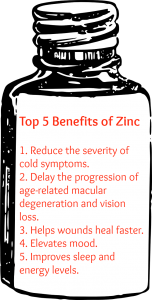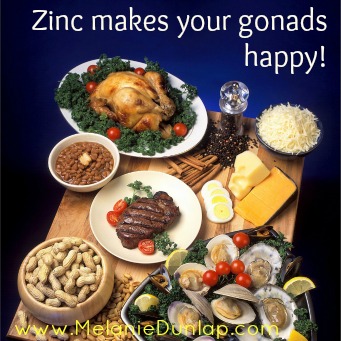Zinc may be last alphabetically on your multivitamin supplement but it is definitely not least. Zinc deficiency can cause impaired immune function, low libido, problems with taste or smell, slow healing of wounds, diarrhea, enlarged prostate, poor appetite, slow growth, skin sores, trouble seeing in the dark and even a loss of interest in learning.
Zinc is an essential trace element that is found in every tissue in the body and is directly involved in cell division. It is a powerful antioxidant and helps balance hormone levels. Low levels of Zinc can worsen the effects of stress on the body and reduce energy levels.
And if your sex life needs a boost zinc should be a part of the plan. For men Zinc improves performance and for women it helps vaginal lubrication.
Used before and after surgery, zinc can help you recover faster and wounds heal quicker. It also aids in the elasticity of skin, keeping you looking younger and more vibrant.
But just like anything else overuse can cause problems. Excess zinc intake can suppress copper absorption and cause nausea, vomiting, stomach pains and headaches.
So how much zinc is enough?
The recommended dietary allowance for zinc is 8mg for women and 11mg for men. However the RDA standard is considered by many to be outdated and instead recommend a daily dose of 15mg.
Holistic practitioners sometimes use doses up to 15 times higher as part of a specific treatment plan. High doses should only be used under the supervision of a qualified wellness practitioner.
Getting zinc from your food
A wide variety of foods contain zinc. Oysters contain more zinc per serving than any other food….but I’m not eating them!
Animal proteins are the next best source. Beef, pork and lamb contain more zinc than fish. The dark meat of chicken has more zinc than the light meat.
Other good food sources are pumpkin seeds, sunflower seeds, yogurt, peas, wild rice, brazil nuts, cashews and peanuts.
Getting zinc from food can be more challenging for vegetarians because they don’t eat meat which actually helps with absorption. Also vegetarians usually eat lots of legumes and whole grains which contain phytates that bind zinc and inhibit absorption.
Here are some tips to help vegetarians get more zinc from their diet:
- Soak beans, grains and seeds in water for several hours before cooking.
- Eat more leavened grain products, such as bread rather than crackers that are unleavened. When bread rises it partially breaks down phytate and allows the body to absorb more.
Even though it doesn’t get a lot of press it is essential for our health and wellbeing. Take the time to evaluate your own intake, keep a record of the foods you eat and look at your supplements to see just how much zinc you are really getting.

